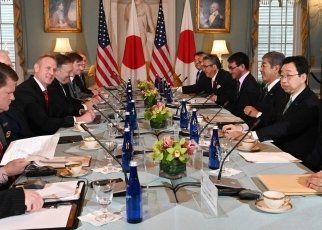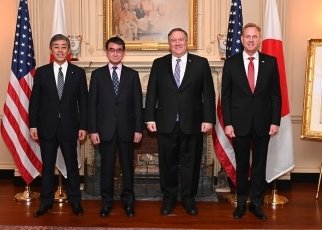April 19, 2019
On April 19, commencing at 8:45 a.m. (U.S. time) for approximately one hour, the Japan-U.S. Security Consultative Committee (SCC) (Japan-U.S. “2+2”) was convened in Washington, D.C., the United States of America. The meeting was attended by Mr. Taro Kono, Minister for Foreign Affairs, and Mr. Takeshi Iwaya, Minister of Defense, from the Japanese side, and the Honorable Mike Pompeo, Secretary of State, and the Honorable Patrick Shanahan, Acting Secretary of Defense, from the U.S. side. The overview of the meeting is as follows (following the meeting, a Joint Statment.pdf was released).
1 Overview
The four ministers exchanged candid views in light of an increasingly complex security environment and mainly confirmed the following three points.
1. The four ministers shared the view that the Japan-U.S. Alliance serves as the cornerstone of peace, security, and prosperity in the Indo-Pacific region, and that Japan and the United States will work together to realize a “free and open Indo-Pacific.” To this end, the four ministers confirmed that Japan and the United States will jointly increase their presence in the region, while collaborating with partners in the region through joint exercises, port calls, and other activities.
2. The four ministers welcomed the alignment of the strategic policy documents of both countries, including Japan’s new National Defense Program Guidelines. The four ministers shared the view that the two countries will strengthen cooperation for cross-domain operations, including capability enhancement in new domains, such as space, cyberspace, and the electromagnetic spectrum.
3. The four ministers shared the view that they will seek to achieve North Korea’s abandonment of all of its weapons of mass destruction and ballistic missiles of all ranges in a complete, verifiable, and irreversible manner in accordance with relevant United Nations (UN) Security Council resolutions. In addition, the four ministers confirmed that Japan and the United States will continue to work together in cooperation with other partner countries in fully implementing UN Security Council resolutions, including combatting ship-to-ship transfers. The four ministers also reaffirmed that U.S. force posture in the region would remain robust, and shared the view on deepening consultation on ensuring deterrence and security in the region. The four ministers also shared the view that they will continue to engage in close cooperation between Japan and the United States as well as among Japan, the United States, and the Republic of Korea. Furthermore, the four ministers shared the view on calling upon North Korea to resolve the Japanese abductions issue immediately.
2 Regional Security Environment
The four ministers exchanged candid views regarding the security environment in the Indo-Pacific region, and expressed serious concern about, and strong opposition to, unilateral coercive attempts to alter the status quo in the East China Sea (ECS) and South China Sea (SCS). The four ministers reaffirmed their determination to work together to safeguard the peace and stability of the ECS, and reconfirmed that Article V of the Japan-U.S. Security Treaty applies to the Senkaku Islands and that both nations oppose any unilateral action that seeks to undermine Japan’s administration of these islands.
3 Strengthening Bilateral Security and Defense Cooperation
1.The four ministers highlighted the importance of cooperation for cross-domain operations. The four ministers confirmed that they will deepen cooperation on space capabilities, and shared the view on promoting cooperation for enhancing space situational awareness (SSA) capabilities through Japan’s development of a Deep Space Radar and hosting of U.S.-provided SSA payloads on Japan’s Quasi Zenith Satellite System. In addition, the four ministers shared the view on enhancing cooperation on cyber issues. They affirmed that international law applies in cyberspace and that a cyber attack could, in certain circumstances, constitute an armed attack for the purposes of Article V of the Japan-U.S. Security Treaty.
2. The four ministers confirmed that it is important to develop defense capabilities efficiently and effectively in order to enhance the deterrence and response capabilities of the Japan-U.S. Alliance. The four ministers shared the view that the two countries will cooperate to introduce advanced weapon systems to Japan and to further streamline the foreign military sales process.
3. The four ministers affirmed the importance of information security, and shared the view on the need for greater supply chain security, noting threats to the defense industrial base, national networks, and critical infrastructure required for mission assurance.
4. In order to improve Japan-U.S. Alliance readiness, the four ministers shared the view on further deepening operational cooperation, such as mutual asset protection, logistical support, and joint Intelligence, Surveillance and Reconnaissance operations.
4 U.S. Forces in Japan
The four ministers shared the view that they will steadily implement the realignment of U.S. forces in Japan, from the perspective of mitigating the impact on local communities including Okinawa, while maintaining the deterrence of the Japan-U.S. Alliance. In particular, the four ministers welcomed the significant progress on the construction of the Futenma Replacement Facility (FRF) and reaffirmed that the relocation of Marine Corps Air Station (MCAS) Futenma to Henoko is the only solution that avoids its continued use. Foreign Minister Kono conveyed to the U.S. side that it is important to mitigate the impact on the local people, including making progress, one by one, on the issues surrounding the operation of U.S. forces and the Status of Forces Agreement (SOFA), while steadily implementing the realignment of U.S. forces. Defense Minister Iwaya requested the U.S. side to minimize the impact of the operation of U.S. forces on local communities, including noise of transient aircraft. The two ministers also requested the U.S. side to prevent incidents and accidents.



